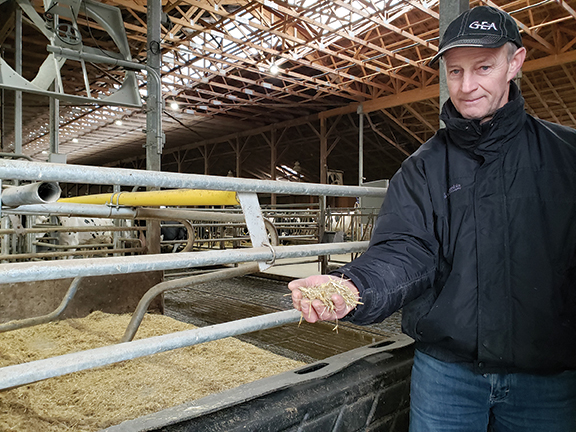ABBOTSFORD – The province has stepped in to backstop farmers facing hard times thanks to a growing number of weather-related and market challenges.
During comments at the BC Agriculture Council’s annual gala in Abbotsford on January 29, BC agriculture minister Lana Popham announced changes to the province’s AgriStability program that she said would make $9 million available to producers.
“We will eliminate the reference margin limits, and we are going to increase the compensation rate from 70% to 80%,” she said. “All farms participating in the program will benefit from the higher compensation rates. Every payment that will come from AgriStability in these two years will be 14.3% higher.”
AgriStability typically provides assistance to producers when farm margins are more than 30% below the average of the previous five years. But the paperwork required to demonstrate reference margins and support a claim means upwards of half the province’s 7,500 commercial producers don’t enroll. The elimination of reference margins removes a major hurdle to participation.
Failed efforts
The announcement followed the ongoing failure of efforts by the federal government in partnership with provincial and territorial ministers of agriculture to reform federal business risk management programs, the costs of which are shared with the provinces.
The Canadian Federation of Agriculture, the umbrella group that represents provincial farm organizations, including the BC Agriculture Council, expressed disappointment following the federal-provincial-territorial agriculture ministers’ meeting in Ottawa in December.
It issued a statement noting its belief that “enhanced AgriStability coverage is needed to ensure farmers have the help they need moving forward to help manage the increasing risks they face beyond their control.”
“The fact that ministers were unable to commit to truly meaningful program reforms, while pushing this issue further down the road through further program reviews, suggests a lack of urgency and a continued disconnect between FPT governments and the realities facing farmers,” CFA president Mary Robinson said at the time. “Farmers continue to see increased trade and policy-related risks exacerbate already challenging weather conditions, threatening the viability of many farms and undermining the primary agriculture sector’s capacity for economic growth.”
Ideally, farm organizations would like to see AgriStability coverage boosted to 85% without a reference margin limit. This is where it was at prior to changes under the Conservative government of Stephen Harper in 2013. The move would be a simple, interim solution with immediate benefits to farmers while ministers reach an agreement on long-term programming changes.
Flawed
AgriStability grew out of the Whole Farm Insurance Program pioneered in BC, and Popham positioned the province as a continued champion of a program that has assisted farmers across the country.
“I’ve felt for a long time that the design of AgriStability has some flaws and it’s not working for farmers in our province. It’s not working for some farmers right across the country,” she said. “I’ve been working very hard to negotiate improvements to that program nationally, but it’s been very challenging to get all of the other provinces and territories on board. At the latest national meeting in December, I signalled that our province might have to go it alone and address what our farmers need.”
This is exactly what it’s done. The announcement also follows on past moves to make assistance more responsive to the immediate circumstances of BC farmers – even those who haven’t viewed it as essential.
A year ago, for example, losses in BC associated with flooding, drought and wildfires in 2018 saw Ottawa and the province open the AgriStability program to those who hadn’t originally enrolled.
The late participation element of the AgriStability program can be triggered when there is a significant income decline in the farm sector and a gap in program participation. By opening it up for late participation, producers who have suffered significant losses can access the help they need.
A precedent for the latest announcement occurred in December 2017, as farmers and ranchers took stock of that year’s devastating wildfires. Once again acting unilaterally, the province provided enhanced AgriStability coverage to producers even if they hadn’t previously enrolled in the program. Reference margins were eliminated, and compensation was boosted to 80%. The initiative was valued at upwards of $10 million in addition to the $10 million available through the joint federal-provincial program.
Tax deferral
The province’s changes to AgriStability were joined by a federal announcement in February expanding regions eligible for the livestock tax deferral provision. Regions eligible in BC include southern Vancouver Island, Haida Gwaii and much of the central Interior from the coast to the Alberta border.
“[The] provision allows livestock producers in prescribed drought, flood or excess moisture regions to defer a portion of their 2019 sale proceeds of breeding livestock until 2020 to help replenish the herd,” explains a statement announcing the eligible regions. “The cost of replacing the animals in 2020 will offset the deferred income, thereby reducing the tax burden associated with the original sale.”
Regions eligible for coverage under the provision must experience forage shortfalls of 50% or more caused by drought or excess moisture.
Producers in many regions in BC have been eligible for tax deferrals for several consecutive years, underscoring the persistent nature of the challenges facing them.
Popham told the agriculture gala in January that she wants to see a more robust risk management program developed to provide the support they need, and wanted BC to set an example of what was possible.
“We want government laws, regulations, policies and programs to contribute to the success of BC agriculture,” she said. “I’m hopeful that by 2021, BC will be successful at negotiating enhancements for all farmers across Canada, but we thought it was important that we showed leadership to make sure that we’re standing up for our farmers.”


 Fruit growers grapple with third year of losses
Fruit growers grapple with third year of losses